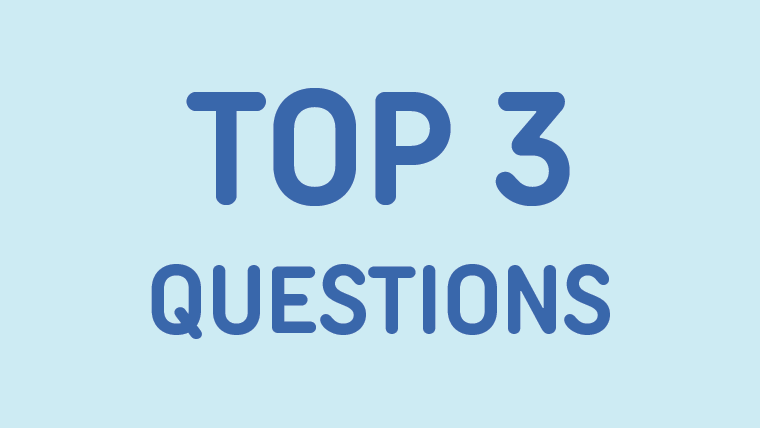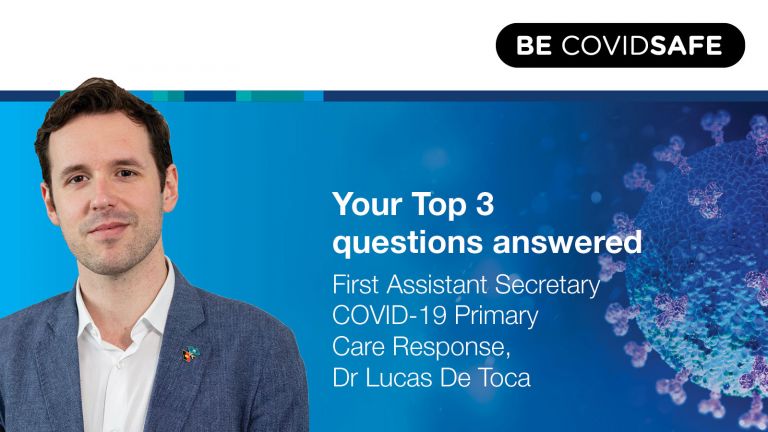
Good morning. I'm Dr Lucas De Toca and I lead the rollout of the vaccine through GPs. I'm here joined by Linda, who is doing Auslan interpreting, and today we will be answering some of your top questions that have been coming through our social media channels. First of all, we are in the land of the Ngunnawal people. Dhawra nhuna, dhawra Ngunawal. Yanggu gulanyin ngalawiri, dhunayi, Ngunawal dhawra. Wanggarralijinyin mariny balan bugarabang, and I acknowledge the traditional owners of the land where people may be watching from. A strong shout out today to people in greater Sydney. You are at home isolating, on lockdown, and we've had some of the highest case numbers that Sydney has seen since the beginning of the pandemic in the last few days. You are doing a fantastic job at keeping us all safe, keeping your community safe by following the public health orders and staying at home. It's hard but we are really grateful for the work you are doing.
The first question that we will be talking about today is - why do I have to get tested when I have symptoms if I just have a mild symptom and I'm pretty sure it is a cold?
That's a very common question because we keep parroting on over the last 16 to 17 months, that if you have symptoms, no matter how mild, you need to get tested. The reason why that happens is that in most cases where COVID is mild, it's almost impossible, just based on symptoms, it's impossible to tell the difference between COVID and the cold, or the flu, or any other respiratory infection or other conditions that may appear. To be safe, the recommendation while we're still in this pandemic context is that, if you have any symptom that is similar to respiratory infection, any cold and flu like symptoms like cough, fever, sore throat, runny nose or shortness of breath, of course, you need to get tested, even if they are super mild. This is particularly important if you are a healthcare worker, and aged care worker, you work in residential care, in disability or aged care, or if you have been through or live in one of the areas that have had high risk of transmission. At the moment, people in greater Sydney are strongly advised to please get tested, even if they have the mildest of symptoms. Even if mildly symptomatic, someone with COVID, who doesn't know they have COVID, can transmit to others and that why it's so important that we do our best to get tested so that we can stamp it out as soon as we detect it.
Another question we are getting is - what are people expected to do when they are asked to quarantine?
Quarantine means for someone to stay away from others when there is a risk they may have contracted a disease. The quarantine period for COVID is 14 days. 14 days comes from our understanding of the incubation period, incubation being the time between your exposure to a virus and the developing of the disease. In most cases with COVID-19, symptoms, if they are going to be symptomatic and the disease appears within a few days from acquiring the virus, but we know it can be up to 14 days between infection and developing symptoms. That is why quarantine is that period, to give you enough time to make sure that if you are going to develop symptoms, it happens while you are isolated and you don't transmit the virus to others. Quarantine, depending on the context, will happen at home or in a hotel. If you are advised to quarantine because you are a first close contact or you've been called by public health authority, it's important that you do it immediately. Go straight home, don't stop even for shopping, just go straight home and isolate. You have to stay in quarantine for the entire 14-day period even if you don't have symptoms and you feel OK because symptoms might appear towards the end. Quarantine means you can't leave your hotel room or your home, depending on where you are quarantining, unless you need to get essential medical care or in the case of an emergency. If you live in a house, you can go outside to your private garden or your balcony in an apartment, but otherwise you cannot go outside even for exercising while you are quarantining. If you are in a hotel, you must stay in your room and cannot have contact with other guests or with the staff of the hotel. If you develop any symptoms, and we've talked about the symptoms, while in quarantine, call the Coronavirus Healthline on 1800 020 080 or your doctor or the public health authorities that advised you to go and quarantine. If you have serious symptoms, if you have pressure in your chest or shortness of breath, call 000 and advise the ambulance that you are quarantining, and may have coronavirus, so they can take appropriate protections. If you are well with no symptoms, other people who live with you don't need to quarantine but you need to stay away from them as much as possible, stay in your room as much as you can, keep physical distance from them, wear a mask if you are in the same room and try to minimise the time that you are with others, if possible use a separate bathroom, and just try not to spend time with them, because indoor settings is where it is more likely that spread happens and you want to protect them from getting the virus. Practice good hand hygiene, cough and sneeze etiquette, into your elbow if you don't have a tissue, and wash your hands frequently and try not to share household items including towels and other things, keep as separate as you can. Sometimes that's difficult in some households. If you live alone and you need medications, call your pharmacist, because there is a program to support pharmacists going to your home to deliver medications that you need. It is tough but it's important we observe quarantine arrangements.
Another question we often get is - why do we need to observe the COVIDSafe behaviours once we are vaccinated?
More than one in 10 people in Australia already are fully vaccinated with two doses of the vaccine and a third of Australians have had at least one dose of the vaccine. So why do the physical distancing and lockdown rules apply to them? The reality of the vaccines are incredibly effective at preventing hospitalisation, severe disease and death, and we are seeing that in the outbreak in Sydney, but they have different effects and we are still learning in terms of preventing transmission. The vaccine will not prevent everyone from getting infected and transmitting the disease, it will dramatically reduce the chances but there is still a chance that someone vaccinated can contract the virus and then transmit it onwards to other people, and that's why it's important that for the time being, where there is a significant proportion of the population unvaccinated, even vaccinated people observe or appropriate COVIDSafe behaviours and lockdown and other public health orders when they are in place. That way we can make sure that unvaccinated people and people who cannot get the vaccine because of underlying conditions or because they are too young to receive the vaccine, are also protected. That way we can do our best to make sure that collectively we all stay safe. Of course, COVIDSafe behaviours don't apply only to outbreaks, lockdowns do. But good physical distancing, good hand hygiene and hand washing, and isolating and getting a test when you have symptoms, apply all throughout Australia regardless of where you are.
That's all the questions we have for today. Thank you so much for watching. We will see you next time.
Top 3 questions
- Why you need to get tested even if you only have mild cold and flu symptoms?
- What are the key things you need to know if you have to quarantine?
- Why the COVIDSafe behaviours are still important - even in those who are vaccinated?







